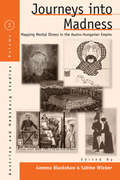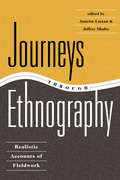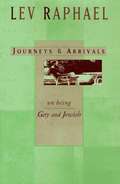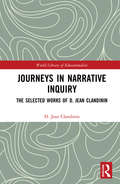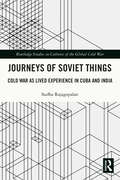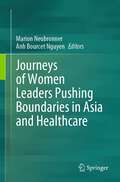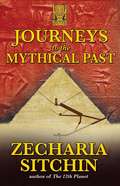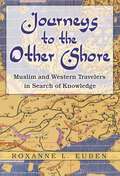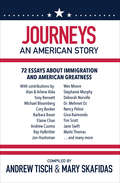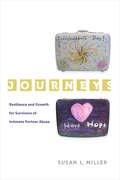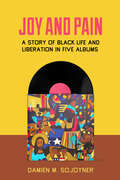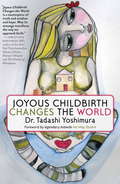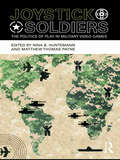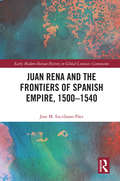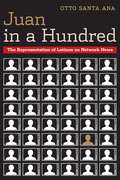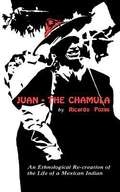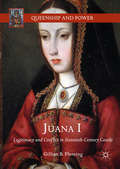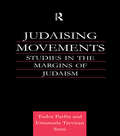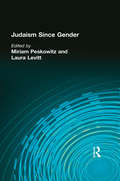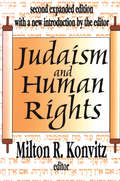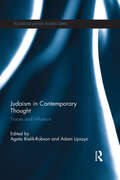- Table View
- List View
Journeys Into Madness: Mapping Mental Illness in the Austro-Hungarian Empire (Austrian and Habsburg Studies #14)
by Gemma Blackshaw Sabine WieberAt the turn of the century, Sigmund Freud's investigation of the mind represented a particular journey into mental illness, but it was not the only exploration of this 'territory' in the Austro-Hungarian Empire. Sanatoriums were the new tourism destinations, psychiatrists were collecting art works produced by patients and writers were developing innovative literary techniques to convey a character's interior life. This collection of essays uses the framework of journeys in order to highlight the diverse artistic, cultural and medical responses to a peculiarly Viennese anxiety about the madness of modern times. The travellers of these journeys vary from patients to doctors, artists to writers, architects to composers and royalty to tourists; in engaging with their histories, the contributors reveal the different ways in which madness was experienced and represented in 'Vienna 1900'.
Journeys Through England in Particular: On Foot
by Angela King Sue CliffordDrawn from the critically acclaimed England In Particular, this delightful book pairs with Journeys Through England in Particular: Coasting to form a new series celebrating English local distinctiveness - ideal for travellers, holiday-makers and armchair browsers. England In Particular, first published in 2006, is a celebration of the distinctive details that cumulatively make England - its buildings, landscapes, people and wildlife. It was the culmination of more than twenty years' work by Sue Clifford and Angela King, who founded the charity Common Ground with Roger Deakin. These small hardbacks will appeal to anyone curious about the particularities of the landscape, from Allotments to Arcades, Fingerposts to Footbridges, Stepping Stones to Stiles. They are edited thematically to create the perfect pocket-sized books for taking with you to the countryside or coast, and will prove good companions wherever you are in England.
Journeys Through Ethnography: Realistic Accounts of Fieldwork
by Annette Lareau<p>Learning how to carry out research projects using participant observation and in-depth interviews has become a priority for scholars in a wide range of fields, including anthropology, sociology, education, social work, nursing, and psychology. This book, a collection of well-known fieldwork accounts covering the qualitative research process, aims to help undergraduate students, graduate students, and scholars in the social sciences understand common problems in the research process and learn strategies for resolving them. <p>Unlike methods books that treat research issues in a superficial or prescriptive fashion, this book realistically portrays, through researchers own accounts, the process of discovery and resolution of conflicts involved in fieldwork. It also shows the costs involved in the choice of solutions. Students and seasoned scholars alike will find the collection a source of knowledge, inspiration, and comfort concerning the complexity of conducting fieldwork.</p>
Journeys and Arrivals: On Being Gay and Jewish
by Lev RaphaelLev Raphael explores in non-fiction the gay and Jewish identities that have dominated his highly acclaimed fiction for many years. He describes growing up in a secular family, discovering a Jewish community, early sexual exploration, the turning point that came with writing his first autobiographical story, and life with his partner and his partner's sons. The book also reports on gay literature, gays and lesbians in Israel, and the legacy of the Holocaust for both Jews and gays.
Journeys in Narrative Inquiry: The Selected Works of D. Jean Clandinin
by D Jean ClandininOrganized around a metaphor of an academic journey, D. Jean Clandinin offers published tracings of an unfolding journey over 40 years that, at its outset, appeared to focus only on questions of epistemology. However, the book illuminates how that apparent beginning focus shape-shifted to questions of methodology, ethics, ontology, and subsequently, political concerns. Clandinin shows that, even at the outset, her research wonders were grounded in relational understandings of experience, understandings that were simultaneously ontological, methodological, epistemological and ethical. Jean’s work is collaborative, an engagement alongside others and within the contexts in which they and she lived and worked, including those who were participants in the research. She continues to acknowledge that narrative inquiry changes people’s ways of being in the world, and those changes have ethical significance. While what she and her colleagues now call relational ethics has always been central, recently her sense of ethics has become more explicitly political. She shows the development of ideas over time, beginning as she entered doctoral work and continuing through 2019 and onward. Jean’s work, centered on relational understandings of experience, highlights ethical dimensions, and has come to define narrative understandings for generations of researchers. This book will be an invaluable resource for researchers and graduate students, and professional researchers in both educational and healthcare settings. .
Journeys into Drugs and Crime: Jamaican Men Involved In The Uk Drugs Trade
by Angie HealThis book analyses the life histories of Jamaican men involved in the UK drugs trade, including wholesalers, street dealers, specialist cooks, cutters, and growers. Employing a life history approach, their autobiographical accounts are examined to provide an in-depth and unique insight of their journeys into drugs and crime.
Journeys of Soviet Things: Cold War as Lived Experience in Cuba and India (Routledge Studies in Cultures of the Global Cold War)
by Sudha RajagopalanAt the intersection of history, material culture studies, and post-socialist memory studies, Journeys of Soviet Things is an oral history of socialist globalisation constructed around the journeys of Cold War era Soviet objects in India and Cuba. During the Cold War, an important means to perpetuate Soviet ideals of modernisation and anti-imperialist solidarity across the world was the circulation of ‘banal’ objects, produced in the Soviet Union and purchased, awarded, and gifted for use in homes across the world. Based on oral accounts of Indian and Cuban interlocutors, this book examines the itineraries of Soviet objects such as cars, washing machines, cameras, books, nesting dolls, porcelain, and many other things. Explored this way, the Cold War is a matter of personal, affective, everyday experience. At the same time, by indicating the cohabitation of things in their home from around the world, interlocutors also go on to undercut simple geopolitical binaries that pit Soviet against American techno-politics. Accounts of Soviet objects in India and Cuba reveal a bricolage of preferences that crisscrossed ideological dualities of East vs West, communist vs capitalist, making for an alternative cosmopolitanism that was in equal measure shaped by personal, local, and national histories and experiences. This book will appeal to researchers and students interested in Cold War history, the history of transnational solidarities, and Soviet material culture.
Journeys of Women Leaders Pushing Boundaries in Asia and Healthcare
by Marion Neubronner Anh Bourcet NguyenThis book brings together a collective of Women Leaders in Healthcare to share their real-life leadership journey in the Asian continent, from a personal angle (heart) and grounded on science (data). They are connected by a strong passion to help improve patient lives and advance women’s leadership in this dynamic, emerging region of Asia, still swaying between tradition and modernity. This is not an academic book but a compendium of inspirational stories meant to provide authentic and pragmatic guidance for women who want to advance their careers in healthcare in Asia, to reduce gender inequality and give a new meaning to the leadership of tomorrow, truly inclusive and diverse.Beyond gender, aspiring leaders can find inspiration from this compendium to succeed in the Asia context, from Japan to India, South East Asia and the Middle East. Although the challenges shared were experienced by the women-authors from diverse backgrounds and leadership, women and men alike can relate to many of the topics covered in the book. The resulting reflections can help the readers more efficiently climb the corporate ladder and become better leaders, to shape a more equitable future. This book provides insights for organizations in their diversity, equity and inclusion endeavors, to develop policies that foster talents in Asia and provide better support to women in leadership positions. It is also a useful read for students and researchers of leadership and gender studies.
Journeys to the Mythical Past
by Zecharia SitchinThe paperback release of the second volume of Sitchin’s autobiographical account of the investigations and discoveries that led to The Earth Chronicles series • Zecharia Sitchin tells how his life was at risk inside the Great Pyramid and reveals the existence of a secret chamber • Reports on Vatican encounters, the Iceman of the Alps, the Antikythera computer, the temples and Ruts of Malta--and offers a solution to the enigma of the Nazca lines • 18,000 copies sold in hardcover since September 2007 In Journeys to the Mythical Past the renowned researcher of antiquity Zecharia Sitchin reveals, for the first time, the existence of a secret chamber in Egypt’s Great Pyramid, and he tells his own story of an indefatigable dedication to finding the truth that almost cost him his life--accidentally or otherwise--when uncovering secrets of the Giza pyramids and Sphinx. Exposing hidden artifacts that contradict establishment assumptions or that baffle scientists, Sitchin’s firsthand accounts of his explorations take the reader into the inner workings of the Vatican, the enigma of a futuristic computer from millennia ago, and the secret handiwork of a Divine Architect at Stonehenge, at Malta, and at a site in the Americas. Looking deep into antiquity, Sitchin offers astounding evidence that links the Nazca lines and a baffling adjoining site to the Departure from Earth of the Anunnaki, the ancient gods who, he believes, vowed to Return.
Journeys to the Other Shore: Muslim and Western Travelers in Search of Knowledge (Princeton Studies in Muslim Politics #23)
by Roxanne L. EubenThe contemporary world is increasingly defined by dizzying flows of people and ideas. But while Western travel is associated with a pioneering spirit of discovery, the dominant image of Muslim mobility is the jihadi who travels not to learn but to destroy. Journeys to the Other Shore challenges these stereotypes by charting the common ways in which Muslim and Western travelers negotiate the dislocation of travel to unfamiliar and strange worlds. In Roxanne Euben's groundbreaking excursion across cultures, geography, history, genre, and genders, travel signifies not only a physical movement across lands and cultures, but also an imaginative journey in which wonder about those who live differently makes it possible to see the world differently. In the book we meet not only Herodotus but also Ibn Battuta, the fourteenth-century Moroccan traveler. Tocqueville's journeys are set against a five-year sojourn in nineteenth-century Paris by the Egyptian writer and translator Rifa'a Rafi' al-Tahtawi, and Montesquieu's novel Persian Letters meets with the memoir of an East African princess, Sayyida Salme. This extraordinary book shows that curiosity about the unknown, the quest to understand foreign cultures, critical distance from one's own world, and the desire to remake the foreign into the familiar are not the monopoly of any single civilization or epoch. Euben demonstrates that the fluidity of identities, cultures, and borders associated with our postcolonial, globalized world has a long history--one shaped not only by Western power but also by an Islamic ethos of travel in search of knowledge.
Journeys: 72 Essays about Immigration and American Greatness
by Alan Alda Arlene AldaA compilation of American immigration tales, featuring seventy-two essays from Nancy Pelosi, Dr. Oz, Michael Bloomberg, Alan Alda, Mary Choi, and others. Journeys captures the quintessential idea of the American dream. The individuals in this book are only a part of the brilliant mosaic of people who came to this country and made it what it is today. Read about the governor&’s grandfathers who dug ditches and cleaned sewers, laying the groundwork for a budding nation; how a future cabinet secretary crossed the ocean at age eleven on a cargo ship; about a young boy who fled violence in Budapest to become one of the most celebrated American football players; the girl who escaped persecution to become the first Vietnamese American woman ever elected to the US congress; or the limo driver whose family took a seventy-year detour before finally arriving at their original destination, along with many other fascinating tales of extraordinary and everyday Americans. In association with the New-York Historical Society, Andrew Tisch and Mary Skafidas have reached out to a variety of notable figures to contribute an enlightening and unique account of their family&’s immigration story. All profits will be donated to the New-York Historical Society and the Statue of Liberty Ellis Island Foundation. Featuring essays by: Arlene Alda, Tony Bennett, Cory Booker, Barbara Boxer, Elaine Chao, Andrew Cuomo, Ray Halbritter, Jon Huntsman, Wes Moore, Stephanie Murphy, Deborah Norville, Dr. Mehmet Oz, Gina Raimondo, Tim Scott, Jane Swift, Marlo Thomas, And many more! &“Illustrate[s] the positive and powerful impact that immigration has had in weaving the fabric of America . . . inspiring.&” —Warren Buffett
Journeys: Resilience and Growth for Survivors of Intimate Partner Abuse (Gender and Justice #5)
by Prof. Susan L. MillerMore than one in three women in the United States has experienced rape, physical violence, or stalking by an intimate partner in their lifetime. Luckily, many are able to escape this life—but what happens to them after? Journeys focuses on the desperately understudied topic of the resiliency of long-term (over 5 years) survivors of intimate partner violence and abuse. Drawing on participant observation research and interviews with women years after the end of their abusive relationships, author Susan L. Miller shares these women’s trials and tribulations, and expounds on the factors that facilitated these women’s success in gaining inner strength, personal efficacy, and transformation. Written for researchers, practitioners, students, and policy makers in criminal justice, sociology, and social services, Journeys shares stories that hope to inspire other victims and survivors while illuminating the different paths to resiliency and growth.
Joy and Pain: A Story of Black Life and Liberation in Five Albums
by Damien M. SojoynerA poignant account of how the carceral state shapes daily life for young Black people—and how Black Americans resist, find joy, and cultivate new visions for the future. At the Southern California Library—a community organization and an archive of radical and progressive movements—the author meets a young man, Marley. In telling Marley’s story, Damien M. Sojoyner depicts the overwhelming nature of Black precarity in the twenty‑first century through the lenses of housing, education, health care, social services, and juvenile detention. But Black life is not defined by precarity; it embraces social visions of radical freedom that allow the pursuit of a life of joy beyond systems of oppression. Structured as a "record collection" of five "albums," this innovative book relates Marley’s personal encounters with everyday aspects of the carceral state through an ethnographic A side and offers deeper context through an anthropological and archival B side. In Joy and Pain, Marley’s experiences at the intersection of history and the contemporary political moment invite us to imagine more expansive futures.
Joyous Childbirth Changes the World
by Ina May Gaskin Dr Tadashi Yoshimura"No matter how science has progressed, childbirth, in essence, has remained unchanged from ancient times . . . [It] is the last natural process left to us," writes internationally lauded obstetrician Dr. Tadashi Yoshimura. "The fact that it has remained unchanged means that there is truth in it." The truth and power of birth is the subject of Dr. Yoshimura's first book published in the United States. Yoshimura describes babies born so directly into the arms of their mothers that they do not cry, and women so transformed with pride and passion in their ability that they are joyous and forever changed. Instead of a medical emergency, Yoshimura describes birth as a transcendent and natural process that cannot be perfected, and that, when performed through the innate power of women, reveals what he calls a "mystic beauty." Full of delightful stories of birthing women and peaceful smiling infants, and helpful tips from his childbirth preparation program, Joyous Childbirth Changes the World is a must-read for all expectant parents and those who care for them. Yoshimura's clinic serves as a testament to the kind of compassionate birth culture that is possible if we prioritize the health and experience of women and babies. From the Trade Paperback edition.
Joystick Soldiers: The Politics of Play in Military Video Games
by Nina B. Huntemann Matthew Thomas PayneJoystick Soldiers is the first anthology to examine the reciprocal relationship between militarism and video games. War has been an integral theme of the games industry since the invention of the first video game, Spacewar! in 1962.While war video games began as entertainment, military organizations soon saw their potential as combat simulation and recruitment tools. A profitable and popular relationship was established between the video game industry and the military, and continues today with video game franchises like America’s Army, which was developed by the U.S.Army as a public relations and recruitment tool. This collection features all new essays that explore how modern warfare has been represented in and influenced by video games. The contributors explore the history and political economy of video games and the "military-entertainment complex;" present textual analyses of military-themed video games such as Metal Gear Solid; and offer reception studies of gamers, fandom, and political activism within online gaming.
Juan Gregorio Palechor: The Story of My Life
by Andy Klatt Myriam JimenoThe Colombian activist Juan Gregorio Palechor (1923-1992) dedicated his life to championing indigenous rights in Cauca, a department in the southwest of Colombia, where he helped found the Regional Indigenous Council of Cauca. Recounting his life story in collaboration with the Colombian anthropologist Myriam Jimeno, Palechor traces his political awakening, his experiences in national politics, the disillusionment that resulted, and his turn to a more radical activism aimed at confronting ethnic discrimination and fighting for indigenous territorial and political sovereignty.Palechor's lively memoir is complemented by Jimeno's reflections on autobiography as an anthropological tool and on the oppressive social and political conditions faced by Colombia's indigenous peoples. A faithful and fluent transcription of Palechor's life story, this work is a uniquely valuable resource for understanding the contemporary indigenous rights movements in Colombia.
Juan Rena and the Frontiers of Spanish Empire, 1500–1540 (Early Modern Iberian History in Global Contexts)
by Jose M. Escribano-PáezThis book explores the political construction of imperial frontiers during the reigns of Ferdinand the Catholic and Charles V in the Iberian Peninsula and the Mediterranean. Contrary to many studies on this topic, this book neither focuses on a specific frontier nor attempts to provide an overview of all the imperial frontiers. Instead, it focuses on a specific individual: Juan Rena (1480–1539). This Venetian clergyman spent 40 years serving the king in several capacities while travelling from the Maghreb to northern Spain, from the Pyrenees to the western fringes of the Ottoman Empire. By focusing on his activities, the book offers an account of the Spanish Empire’s frontiers as a vibrant political space where a multiplicity of figures interacted to shape power relations from below. Furthermore, it describes how merchants, military officers, nobles, local elites and royal agents forged a specific political culture in the empire’s liminal spaces. Through their negotiations and cooperation, but also through their competition and clashes, they created practices and norms in areas like cross-cultural diplomacy, the making of the social fabric, the definition of new jurisdictions, and the mobilization of resources for war.
Juan in a Hundred: The Representation of Latinos on Network News
by Otto Santa AnaLatinos constitute the fastest-growing and largest ethnic minority in the United States, yet less than one percent of network news coverage deals with Latinos as the focus of a story. Out of that one percent, even fewer stories are positive in either content or tone. Author of the acclaimed Brown Tide Rising: Metaphors of Latinos in Contemporary American Public Discourse, Otto Santa Ana has completed a comprehensive analysis of this situation, blending quantitative research with semiotic readings and ultimately applying cognitive science and humanist theory to explain the repercussions of this marginal, negative coverage. Santa Ana's choice of network evening news as the foundation for Juan in a Hundred is significant because that medium is currently the single most authoritative and influential source of opinion-generating content. In his 2004 research, Santa Ana calculated that among approximately 12,000 stories airing across four networks (ABC, CBS, CNN, NBC), only 118 dealt with Latinos, a ratio that has remained stagnant over the past fifteen years. Examining the content of the stories, from briefs to features, reveals that Latino-tagged events are apparently only broadcast when national politics or human calamity are involved, and even then, the Latino issue is often tangential to a news story as a whole. On global events involving Latin America, U.S. networks often remain silent while BBC correspondents prepare fully developed, humanizing coverage. The book concludes by demonstrating how this obscurity and misinformation perpetuate maligned perceptions about Latinos. Santa Ana's inspiring calls for reform are poised to change the face of network news in America.
Juan the Chamula: An Ethnological Re-creation of the Life of a Mexican Indian
by Lysander Kemp Ricardo PozasThis book concerns an indigenous group of Tzotzil-speaking Indians living in the mountain highlands in the state of Chiapas in southern Mexico. It has been recognized as one of the most skillful handlings of Indian themes in Mexican literature.
Juana I: Legitimacy And Conflict In Sixteenth-century Castile (Queenship and Power)
by Gillian B. FlemingThis book examines the deep and lengthy crisis of legitimacy triggered by the death of Prince Juan of Castile and Aragon in 1497 and the subsequent ascent of Juana I to the throne in 1504. Confined by historiography and myth to the madwoman’s attic, Juana emerges here as a key figure at the heart of a period of tremendous upheaval, reaching its peak in the war of the Comunidades, or comunero uprising of 1520–1522. Gillian Fleming traces the conflicts generated by the ambitions of Juana’s father, husband and son, and the controversial marginalisation and imprisonment of Isabel of Castile’s legitimate heir. Analysing Juana’s problems and strategies, failures and successes, Fleming argues that the period cannot be properly understood without taking into account the long shadow that Juana I cast over her kingdoms and over a crucial period of transition for Spain and Europe.
Jubilee Time: Celebrating Women, Spirit, And The Advent Of Age
by Maria HarrisIn keeping with the bestselling When I Am an Old Woman I Shall Wear Purple, and Gail Sheehy's New Passages, Jubilee Time celebrates the freedom, opportunities, and power of older women, who are too often maligned in our youth-obsessed culture. Based on the Jubilee passage in Leviticus--"You shall hallow the fiftieth year. It shall be a Jubilee for you"--this practical and philosophical book helps women assess what values and beliefs they want to carry forward into the second half of life.A Jubilarian herself, Harris draws on her own experience and cites others--including May Sarton, Anne Morrow Lindbergh, M.F.K. Fisher, Florida Scott-Maxwell, Doris Grumbach, as well as more than one hundred "ordinary" women--to reflect the variety and vitality of this unheralded community. In lyrical prose punctuated by exercises and meditations, she invites readers to rest and reflect, stop and take stock, celebrate and cultivate the rich rewards of a mature spirituality.From the Trade Paperback edition.
Judaising Movements: Studies in the Margins of Judaism in Modern Times (Routledge Jewish Studies Series)
by Tudor Parfitt Emanuela Trevisan SemiThe history of Judaising movements has been largely ignored by historians of religion. This volume analyzes the interplay between colonialism, a Judaism not traditionally viewed as proselytising but which at certain points was struggling to heed the Prophets and become a light unto the Gentiles' and the attraction for many different peoples of the rooted historicity of Judaism and by the symbolic appropriation of Jewish suffering. This book will look at the role of colonialism in the development of Judaising movements throughout the world, including New Zealand, Japan, India, Burma and Africa. Particular attention will be paid to the Lemba tribe of Southern Africa. A remarkable parallel movement in 1930s Southern Italy will also be dealt with. The history of the converts of San Nicandro is seen in the context of currents of Jewish universalism, messianism and Zionism. Gender issues are also discussed here as the converted women assumed powers they had not hitherto enjoyed.
Judaism Since Gender
by Miriam Peskowitz Laura LevittJudaism Since Gender offers a radically new concept of Jewish Studies, staking out new intellectual terrain and redefining the discipline as an intrinsically feminist practice. The question of how knowledge is gendered has been discussed by philosophers and feminists for years, yet is still new to many scholars of Judaism. Judaism Since Gender illuminates a crucial debate among intellectuals both within and outside the academy, and ultimately overturns the belief that scholars of Judaism are still largely oblivious of recent developments in the study of gender. Offering a range of provocations--Jewish men as sissies, Jesus as transvestite, the problem of eroticizing Holocaust narratives--this timely collection pits the joys of transgression against desires for cultural wholeness.
Judaism and Human Rights
by Carlos RipollAreligion or a culture like Judaism, at least three thousand years old, cannot be expected to be all of one piece, homogeneous, self-contained, consistent, a neatly constructed system of ideas. If Judaism were that, it would have died centuries ago and would be a subject of interest only to the historian and archaeologist. Judaism has been a living force precisely because it is a teeming, thundering, and clamoring phenomenon, full of contrary tendencies and inconsistencies. Although there are no words or phrases in Hebrew Scriptures for "human rights," "conscience," or "due process of law," the ideals and values which these concepts represent were inherent in the earliest Jewish texts.This volume begins with four essays on the concept of man's being born "free and equal," in the image of God. The underpinning of this concept in Jewish law is explored in Section 2, entitled "The Rule of Law." Section 3, "The Democratic Ideal," traces the foundations of democracy in the Jewish teachings in the Bible and the Talmud, which in turn influenced the whole body of Western political thought. Relations between man and man, man and woman, employer and employee, slave and master are all spelled out. Section 4 presents essays analyzing man's freedom of conscience, and his God-given rights to dissent and protest. Section 5 deals with aspects of personal liberty, including the right of privacy. Section 6, entitled "The Earth is the Lord's," deals with the Jewish view of man's transient tenancy on God's earth, his obligations not to destroy anything that lives or grows, and to share the earth's bounty with the poor, the widowed, and the orphaned. Section 7 delivers an analysis of the "end of days" vision of Micah and man's continuing need to strive for peace and not for war. The volume concludes with three new essays, dealing with contemporary issues: "In God's Image: The Religious Imperative of Equality under Law"; "The Values of a Jewish and Democratic State: The Task of Reaching a Synthesis"; and "Religious Freedom and Religious Coercion in the State of Israel."This enlarged edition is accessibly written for a general and scholarly audience and will be of particular interest to political scientists, historians, and constitutional scholars.
Judaism in Contemporary Thought: Traces and Influence (Routledge Jewish Studies Series)
by Agata Bielik-Robson Adam LipszycThe central aim of this collection is to trace the presence of Jewish tradition in contemporary philosophy. This presence is, on the one hand, undeniable, manifesting itself in manifold allusions and influences – on the other hand, difficult to define, rarely referring to openly revealed Judaic sources. Following the recent tradition of Lévinas and Derrida, this book tentatively refers to this mode of presence in terms of "traces of Judaism" and the contributors grapple with the following questions: What are these traces and how can we track them down? Is there such a thing as "Jewish difference" that truly makes a difference in philosophy? And if so, how can we define it? The additional working hypothesis, accepted by some and challenged by other contributors, is that Jewish thought draws, explicitly or implicitly, on three main concepts of Jewish theology, creation, revelation and redemption. If this is the case, then the specificity of the Jewish contribution to modern philosophy and the theoretical humanities should be found in – sometimes open, sometimes hidden – fidelity to these three categories. Offering a new understanding of the relationship between philosophy and theology, this book is an important contribution to the fields of Theology, Philosophy and Jewish Studies.
